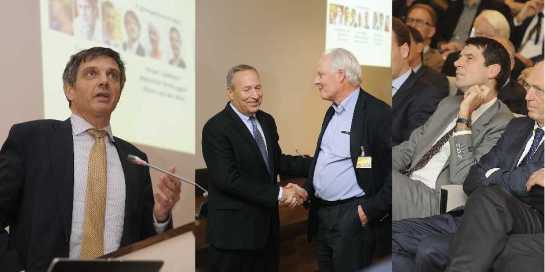Larry Summers gives the Tinbergen lecture
Friday October 31 Larry Summers gave the 27th Tinbergen Lecture, organised by KVS, the Royal Dutch Association for Political Economy. The title of the lecture is Perspectives on Secular Stagnation. The main thesis: if the world doesn’t choose for a large fiscal expansion then it runs the risk of a long period of stagnation. The advantage of the lecture is that Summers runs through the various aspects, and presents the clear policy choices: (1) Structural reform (likely with austerity), (2) Raise spending (fiscal expenditure, government investments), (3) Reduce real rates (even more monetary expansion with likely more inflation). His joke: when presenting a case to the President, give three options, with your advice in the middle.
I am “glad” that Summers confirms this part of my own analysis, though the prospect of stagnation isn’t something to be glad about. Summers’s advice actually may be some kind of turn-about, since in the past he was in the financial-monetary track.
My memo of April 2009 Gliding into the Bush-Obama Depression has the same theme. At that time Summers was director of the US National Economic Council, and pursued a policy of restoring banks and confidence in Wall Street. The US Fed had started quantitative easing in November 2008. We now know that much if not most new money didn’t land in the US but was exported to more promising investment opportunities in the emerging economies, raising their currencies and inflation (a critique by Joseph Stiglitz). During the Clinton Presidency 1993-2001 Summers was influential in the financial deregulation and the abolition of the Glass-Steagall Act and thus the onset of the crisis. Let me quote my 2009 memo:
“Does Obama have an alternative ? He must choose from US economists. Leonhardt (2008) refers to the “Battle of the Bobs” between Robert Rubin and Robert Reich during the Clinton Administration, that apparently Rubin won. Reich now has won the argument that deregulation has turned out to be disastrous. But that does not imply that he was right on intervention in the market to directly do something about unemployment. Conditional on the state of economic theory in the US, the “Battle of the Bobs” still is undecided. Robert Reich still hasn’t won the argument that the government should step in with an interventionist agenda, since his argumentation is unconvincing. But that does not mean that Robert Rubin has won the argument that it shouldn’t. When unemployment rises to 10% society better steps in, and for sure if it stays this high during a number of years. The real US problem is their state of economic theory. It is OK that the two Bobs discuss with each other but it is not OK that they are not open to a discussion with others.”
The New Yorker April 21, 2014, about Elizabeth Warren’s book, mentions another advice for Presidential circles:
“In the spring of 2009, after the panel issued its third report, critical of the bailout, Larry Summers took Warren out to dinner in Washington and, she recalls, told her that she had a choice to make. She could be an insider or an outsider, but if she was going to be an insider she needed to understand one unbreakable rule about insiders: “They don’t criticize other insiders.””
Overall, I would advise more openness in Presidential circles. It should be possible to present a critical argument and increase the quality of discussion both inside and outside.
Overall, my points w.r.t. Summers’s lecture are:
- Summers said that It may matter who brings the message. He hoped that his argument would be heard by economists in Germany and Holland, since those have a better position to argue for investments than economists from Southern Europe who might be regarded as self-serving. However, to convince the Dutch, Summers must take into account that Holland has an export surplus since 1981 – thus some 33 years. See the lecture by H.J. Witteveen. There are vested interests her. The Dutch “mantra” of wage moderation makes for easy economic analysis and policy advice. Apparently it blocks thinking about alternatives.
- Instead of general wage moderation, an alternative policy for Holland (and now Germany) would be a differential wage policy, notably: higher wages for productive workers (commonly in the exposed sectors), and lower wage costs (supported by proper taxation to support net income) for the lower productive workers (commonly in the sheltered sectors). See my 1996 paper on this, building on the analysis by Van Schaaijk and Bakhoven, and the original 1990 paper when I worked at the Dutch Central Planning Bureau (CPB) in 1982-1991.
- My advice is that each nation adopts a constitutional Economic Supreme Court (ESC), based in economic science rather than bureaucracy, that checks the quality of information for decision making, and that has the power to veto the budget if the information in the budget would be misleading according to that court. This is my memo in the Royal Economic Society Newsletter of October 2014: http://www.res.org.uk/view/art7Oct14Features.html
- When the Dutch Central Planning Bureau (CPB, founded by Tinbergen) would be changed into an ESC then it would mean a promotion. Current forecasts are conditional on the assumption that the government speaks truth and that policy will be successful, but an ESC would be able to make unconditional forecasts. The Executive Branch would still be free to decide what to do but would lose some degrees of freedom for disinforming Parliament and the public.
- Olivier Blanchard, now at the IMF, in his 1999 Tinbergen Lecture, in reviewing macro-economic theory at that time, thanked me for my comment on the historical origin of the word “macro-economics” – in 1999 I followed the Dutch convention that it was due to former CPB-director Pieter de Wolff in 1939 but it now appears that it is due to Ragnar Frisch in 1933, see Kevin D. Hoover 2012 and some fine sheets 2014 – but apparently Blanchard in 1999 wasn’t convinced yet about the advice for both an Economic Supreme Court and the advice on taxation and the minimum wage. He ought to be able to quickly relate to the issue once he realizes the link to the current threat of stagnation.
Present at the event were Sweder van Wijnbergen (1951) and Coen Teulings (1958). These professors have been participant in the discussion but also the creation of Dutch economic policy for a fairly long time after 1990. Van Wijnbergen was for a short time the top civil servant at the Ministery of Economic Affairs, and supervised the CPB. Teulings was head of an incomes policy unit at the Ministry of Social Affairs and was director of the CPB in 2006-2013. Teulings did not accept that the economic crisis since 2007 was another confirmation of my analysis. They may not be aware of what I describe as “vested interests”. They may also not have been aware of the quality of the analysis. It may indeed matter who brings the message. Having heard Summers’s perspective on Secular Stagnation, they might perhaps help out that my analysis on unemployment is no longer blocked from discussion at the Dutch CPB, that I can run the Athena model there (that I helped build there, and adapt it where errors can be proven), and that my paper can be published so that the scientific community can discuss it. But everyone may doubt whether the world works like that. The chairman of the KVS and host to the Tinbergen Lecture, is Arnoud Boot (1960), professor in Amsterdam and member of the WRR Scientific Council for Government Policy. He has a general awareness of some of these issues but obviously isn’t convinced yet, either of Secular Stagnation or the relation of my analysis and the blockage at CPB to Secular Stagnation.

Arnoud Boot, Larry Summers, Sweder van Wijnbergen, Coen Teulings, at Tinbergen Lecture October 31, 2014 (Source: KVS website)
It appears that Summers was born in 1954 too, like Angela Merkel and François Hollande, and me. When I told Jan Tinbergen of the problem at CPB, he recognised that such problems might arise in the current institutional framework, but he also said that he was too old for that and that the younger generation ought to solve it. An understandable position. I hope that it still occurs in my generation.
PS 1. As I am reading Harlan McCracken (1961), Keynesian Economics in the Stream of Economic Thought, Louisiana State University Press, because of my earlier discussion of Malthus in Maastricht, it is amazingly logical to see McCracken discuss … secular stagnation. Well, McCracken 1961 refers to Alvin Hansen as Summers 2014 does, so there is no surprise there. McCracken tends to reject the danger of secular stagnation with the optimism of 1960, though he admits the impact of WW 2. Our “advantage” is the crisis of 2007+, though for me the situation after the Fall of the Berlin Wall 25 years ago sufficed to develop that alternative analysis on unemployment and the Economic Supreme Court, see here.
PS. 2. Since this weblog has a vested interest in the education of mathematics, we must report the following google results on Iris Mack and her Phat Math project on math education. Apparently the link http://www.phatmath.com doesn’t work and last month saw a failed attempt at fundraising. Her Wilmott weblog recently consists of links to events or reports by others. Apparently Mack worked at the Harvard Management Company (HMC) during Summers’s Harvard Presidency, warned about risks and had to depart around 2002, and later around 2007 she and Robert Rubin met in a Miami beach area; well, this is her story in the Huffington Post 2010. Playwright Nancy McCleman has tried to evaluate Mack’s website and ends up in disappointment. That seems to be a good description of my own sentiment too, that this weblog evaluation of the 27th Tinbergen Lecture must have this PS 2.

